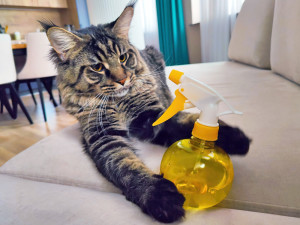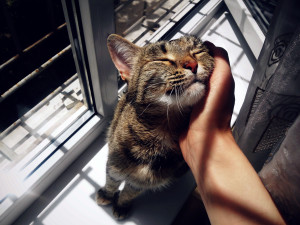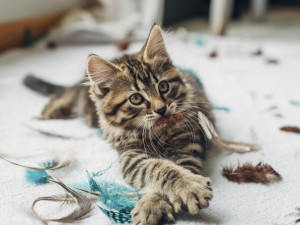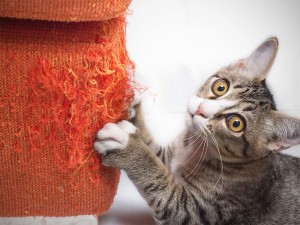What Is the Best Antibiotic for Cat Bites?
When playtime gets a little rough, here’s how to take care of yourself.

share article
In This Article:
Understanding Cat-Bite Infectionsopens in a new tab Best Antibiotics for Cat Bitesopens in a new tab When to Seek Emergency Medical Attentionopens in a new tab
It’s hard to believe that your cat might ever bite you in a non-playful way, but it’s something that can happen. While a bite from your fave kitty might seem minor at the moment, cat bites can cause serious infection if they remain untreated or not treated properly.
Knowing the right antibiotics for cat bites is a good way to ensure a quick recovery and prevent any unforeseen medical complications.
Understanding cat-bite infections
Cats are obligate carnivores, which basically means they need animal protein to survive. So, that’s why they have super-sharp canine teeth that can puncture flesh. They also have bacteria in their mouths, and when they bite a human the puncture wounds they leave behind seal over quickly, so any bacteria in their mouths will get trapped.
The most common bacteria found in a cat’s mouth is Pasteurella multocida, which will cause an infection. A bite infection by Pasteurella multocida will leave a painful, red puncture that will get swollen. Without treatment, it can spread causing cellulitis, a bacterial infection of the skin.
“Additionally, if there is concern about a bite from a rabid animal (this is rare among cats in the United States), a medical evaluation is indicated. Furthermore, all patients who have had a mammalian bite should be assessed for the need for tetanus vaccination,” Dr. Grace Haser, a fellow at the University of San Francisco Department of Infectious Disease, says.
Best antibiotics for cat bites
Amoxicillin-clavulanate (Augmentin)
After tending to a cat bite at home by cleaning the wound with water, then soap and water, and bandaging the area, you should go to an urgent care or your primary-care physician, if they are immediately available.
The most common antibiotic for cat bites that’s prescribed is Amoxicillin-clavulanate, which someone should take for three to five days to prevent infection. Haser says that this is the most prescribed of antibiotics.
“The first-line antibiotic for most cat bites is amoxicillin-clavulanate, an oral antibiotic that provides coverage of the most common bacteria that can cause infections after cat bites,” she says.
Doxycycline
Doxycycline with or without metronidazole is prescribed for those who are allergic to penicillin or penicillin-resistant.
Clindamycin
After a cat bite, Clindamycin is another alternative antibiotic for those who may be allergic to penicillin.
Trimethoprim-sulfamethoxazole (Bactrim)
Bactrim is another alternative antibiotic that can be prescribed for cat bites.
Best antibiotic treatment for cat bite if allergic to Penicillin
There are many types of alternative antibiotics that can be prescribed for cat bites for those who are allergic. Haser says, “For patients who cannot receive amoxicillin-clavulanate (due to a penicillin allergy or other reason), there are alternative agents that are effective, such as trimethoprim-sulfamethoxazole, levofloxacin, or doxycycline with metronidazole or clindamycin.”
IV antibiotics for cat bites
In specific cat-bite cases, your healthcare provider might resort to IV antibiotics.
“If there are signs of severe infection and/or a person cannot take oral antibiotics after a cat bite, the patient can be treated with IV antibiotics,” Haser explains. “For example, they may be treated with IV ampicillin-sulbactam, which has the same bacterial coverage as oral amoxicillin-clavulanate. Depending on the severity of the infection and other risk factors, additional IV antibiotics may be used.”
Antibiotic cream for cat bites
While reaching for an antibiotic cream, like Neosporin, that you would use for a regular wound, might seem like a good idea, they aren’t much help in terms of cat bites.
“Antibiotic creams have limited utility in cat bites,” Haser cautions. “All wounds should be washed with soap and water. Depending on how deep the wound is or if repair is indicated, a medical provider may use an antiseptic or antibiotic solution to clean the wound in addition to prescribing antibiotics.”
When to seek emergency medial attention
Deep puncture wounds or excessive bleeding
Again, cats have very sharp, needle-like teeth, and if they cause a deep puncture wound or bleeding, after cleaning and bandaging the wound, the person bitten should seek medical attention.
“Someone who has been bitten by a cat should almost always seek medical attention because cats’ sharp teeth often result in deep puncture wounds, which are more likely to get infected. Thus, most cat bites warrant antibiotic prophylaxis among other treatments,” Haser explains.
Signs of systemic infection
Signs to watch out for after a cat bite in case of infection can range. The wound itself may be painful, red, and swollen. There also may be red streaks around the wound area, skin discoloration, and pus or fluid leaking from the wound itself. Other signs may be fever, swollen glands, fatigue, and night sweats.
Bites to high-risk areas
Any bites to a high-risk area should be immediately seen by a medical professional, Haser says: “Wounds to sensitive areas such as the face, hands, or genitals and severe wounds (i.e., significant bleeding, signs of infection such as fever, redness, swelling, pus) should be evaluated promptly by a medical professional.”
FAQs (People also ask):
Why does my cat bite me?
There are many reasons that cats bite. It can be a sign of affection or can happen while playing. In cases of more aggressive bites, it may be because your cat is anxious or overstimulated. And it could also be because your cat is afraid or stressed.
Should I break up a cat fight?
It’s important to first recognize, for the safety of everyone, what kind of fight between cats is occurring. Are they just playingopens in a new tab? Or is it something more serious? If cats have their claws out or fur up, that might be a signal that this isn’t a playful fight, you may need to (safely) take further actionopens in a new tab.

Kerensa Cadenas
Kerensa Cadenas is a writer based in New York. She’s previously worked at The Cut, Thrillist, Cosmopolitan, and Complex. Her work has been featured in Vulture, GQ, Vanity Fair, and others.
Related articles
![A kitten playing with feathers]() opens in a new tab
opens in a new tabNot All Cat Toys Are Created Equal
Here are the toys that will motivate your pet to get in the game.
![A woman with curly black hair sitting in front of a dark purple and yellow backdrop while looking down affectionately at her two cats sitting on her lap]() opens in a new tab
opens in a new tabHow to Build Your New Cat’s Trust in You
If your cat still approaches you with a figurative arched eyebrow of skepticism, try these tricks to put them at ease.
![Training a cat sitting with leash and harness on.]() opens in a new tab
opens in a new tabA Step by Step Guide on How to Clicker Train Your Cat
This popular training technique isn’t just for dogs. Here’s how you can use it for your cat.
![An angry and hissing Siamese kitten standing on top of a laptop computer in the living room]() opens in a new tab
opens in a new tabYou Don’t Have to Live Like This—You Can Get a Trainer For Your Cat
Tips to help you find a legit behaviorist (according to a veterinary behaviorist).
![Kitten scratching fabric sofa]() opens in a new tab
opens in a new tabHow to Stop Your Cat From Absolutely Ripping Apart Your Couch
Placing a cat tree or post in a room only, uh, scratches the surface of solving this problem.
![Grey cat sitting on on stairs scratching at the cactus shaped Meyou Paris Vegas Scratcher]() opens in a new tab
opens in a new tabThe Best Cat Scratching Posts, Pads and Everything in Between
Your cat’s claws are out. Do you have scratchers at the ready?









